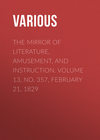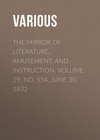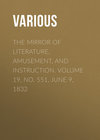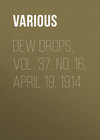Loe raamatut: «The Mirror of Literature, Amusement, and Instruction. Volume 13, No. 357, February 21, 1829», lehekülg 4
MUNGO PARK
Captain Clapperton being near that part of the Quorra, where Mungo Park perished, our traveller thought he might get some information of this melancholy event. The head man's story is this:– "That the boat stuck fast between two rocks; that the people in it laid out four anchors a-head; that the water falls down with great rapidity from the rocks, and that the white men, in attempting to get on shore, were drowned; that crowds of people went to look at them, but the white men did not shoot at them as I had heard; that the natives were too much frightened either to shoot at them or to assist them; that there were found a great many things in the boat, books and riches, which the Sultan of Boussa has got; that beef cut in slices and salted was in great plenty in the boat; that the people of Boussa who had eaten of it all died, because it was human flesh, and that they knew we white men eat human flesh. I was indebted to the messenger of Yarro for a defence, who told the narrator that I was much more nice in my eating than his countrymen were. But it was with some difficulty I could persuade him that if his story was true, it was the people's own fears that had killed them; that the meat was good beef or mutton: that I had eaten more goats' flesh since I had been in this country than ever I had done in my life; that in England we eat nothing but fowls, beef, and mutton."—Clapperton's Travels.
SILK
We find in a statement of the raw silk imported into England, from all parts of the world, that in 1814, it amounted to one million, six hundred and thirty-four thousand, five hundred and one pounds; and in 1824, to three millions, three hundred and eighty-two thousand, three hundred and fifty-seven.9 Italy, which is not better situated in regard to the culture of silk than a large portion of the United States, furnishes to the English fabrics about eight hundred thousand pounds' weight. The Bengal silk is complained of by the British manufacturers, on account of its defective preparation; by bestowing more care on his produce, the American cultivator could have in England the advantage over the British East Indies. It is a fact well worthy of notice, and the accuracy of which seems warranted by its having been brought before a Committee of both Houses of Parliament, that the labour in preparing new silk affords much more employment to the country producing it, than any other raw material. It appears from an official document, that the value of the imports of raw silk into France, during the year 1824, amounted to thirty seven millions, one hundred and forty-nine thousand, nine hundred and sixty francs.—North American Review.
CHINESE NOVELS
A union of three persons, cemented by a conformity of taste and character, constitutes, in the opinion of the Chinese, the perfection of earthly happiness, a sort of ideal bliss, reserved by heaven for peculiar favourites as a suitable reward for their talent and virtue. Looking at the subject under this point of view, their novel-writers not unfrequently arrange matters so as to secure this double felicity to their heroes at the close of the work; and a catastrophe of this kind is regarded as the most satisfactory that can be employed. Without exposing ourselves to the danger incurred by one of the German divines, who was nearly torn to pieces by the mob of Stockholm for defending polygamy, we may venture to remark, that for the mere purposes of art, this system certainly possesses very great advantages. It furnishes the novel-writer with an easy method of giving general satisfaction to all his characters, at the end of the tale, without recurring to the fatal though convenient intervention of consumption and suicide, with us the only resources, when there happens to be a heroine too many. What floods of tears would not the Chinese method have spared to the high-minded Corinna, to the interesting and poetical Clementina! From what bitter pangs would it not have relieved the irresolute Oswald, perhaps even the virtuous Grandison himself! The Chinese are entitled to the honour of having invented the domestic and historical novel several centuries before they were introduced in Europe. Fables, tales of supernatural events, and epic poems, belong to the infancy of nations; but the real novel is the product of a later period in the progress of society, when men are led to reflect upon the incidents of domestic life, the movement of the passions, the analysis of sentiment, and the conflicts of adverse interests and opinions. —Preface to a French Translation of a Chinese Novel.
HERO OF A CHINESE NOVEL
There came out a youth of about fifteen or sixteen years of age, dressed in a violet robe with a light cap on his head. His vermilion lips, brilliant white teeth, and arched eye-brows gave him the air of a charming girl. So graceful and airy are his movements, that one might well ask, whether he be mortal or a heavenly spirit. He looks like a sylph formed of the essence of flowers, or a soul descended from the moon. Is it indeed a youth who has come out to divert himself, or is it a sweet perfume from the inner apartment?—Ibid.
BEES
It has been the custom, from the earliest ages, to rub the inside of the hive with a handful of salt and clover, or some other grass or sweet-scented herb, previously to the swarm's being put in the hive. We have seen no advantage in this; on the contrary, it gives a great deal of unnecessary labour to the bees, as they will be compelled to remove every particle of foreign matter from the hive before they begin to work. A clean, cool hive, free from any peculiar smell or mustiness, will be acceptable to the bees; and the more closely the hive is joined together, the less labour will the insects have, whose first care it is to stop up every crevice, that light and air may be excluded. We must not omit to reprehend, as utterly useless, the vile practice of making an astounding noise, with tin pans and kettles, when the bees are swarming. It may have originated in some ancient superstition, or it may have been the signal to call aid from the fields, to assist in the hiving. If harmless it is unnecessary; and everything that tends to encumber the management of bees should be avoided.—American Farmer's Manual.
CONVENT GARDEN MARKET

Covent Garden Market.—"Here to-day, and gone to-morrow."—Tristram Shandy.
I know some of the ugliest men who are the most agreeable fellows in the world. The ladies may doubt this remark; but if they compel me to produce an example, I shall waive all modesty, and prove my veracity by quoting myself. I have often thought how it is that ugliness contrives to invest itself with a "certain something," that not only destroys its disagreeable properties, but actually commands an interest—(by the by, this is referring generally, and nothing personal to myself.) I philosophically refer it all to the balance of nature. Now I know some very ugly places that have a degree of interest, and here again I fancy a lady's sceptical ejaculation, "Indeed!" Ay, but it is so; and let us go no further than Covent Garden. Enter it from Russell-street. What can be more unsightly,—with its piles of cabbages in the street, and basket-measures on the roofs of the shops—narrow alleys, wooden buildings, rotting vegetables "undique," and swarms of Irish basket-women, who wander about like the ghosts on this side of the Styx, and who, in habits, features, and dialect, appear as if belonging to another world. Yet the Garden, like every garden, has its charms. I have lounged through it on a summer's day, mixing with pretty women, looking upon choice fruit, smelling delicious roses, with now and then an admixture of sundry disagreeables, such as a vigorous puff out of an ugly old woman's doodeen, just as you are about to make a pretty speech to a much prettier lady—to say nothing of the unpleasant odours arising from heaps of putrescent vegetables, or your hat being suddenly knocked off by a contact with some unlucky Irish basket-woman, with cabbages piled on her head sufficient for a month's consumption at Williams's boiled beef and cabbage warehouse, in the Old Bailey. The narrow passages through this mart remind me of the Chinese streets, where all is shop, bustle, squeeze, and commerce. The lips of the fair promenaders I collate (in my mind's eye, gentle reader) with the delicious cherry, and match their complexions with the peach, the nectarine, the rose, red or white, and even sometimes with the russet apple. Then again I lounge amidst chests of oranges, baskets of nuts, and other et cetera, which, as boys, we relished in the play-ground, or, in maturer years, have enjoyed at the wine feast. Here I can saunter in a green-house among plants and heaths, studying botany and beauty. Facing me is a herb-shop, where old nurses, like Medeas of the day, obtain herbs for the sick and dying; and within a door or two flourishes a vender of the choicest fruits, with a rich display of every luxury to delight the living and the healthy.
I know of no spot where such variety may be seen in so small a compass. Rich and poor, from the almost naked to the almost naked lady (of fashion, of course.) "Oh crikey, Bill," roared a chimney-sweep in high glee. The villain turned a pirouette in his rags, and in the centre mall of the Garden too; he finished it awkwardly, made a stagger, and recovered himself against—what?—"Animus meminisse horret"—against a lady's white gown! But he apologized. Oh, ye gods! his apology was so sincere, his manner was so sincere, that the true and thorough gentleman was in his every act and word. (Mem. merely as a corroboration, the lady forgave him.) What a lesson would this act of the man of high callings (from the chimney-tops) have been to our mustachioed and be-whiskered dandies, who, instead of apologizing to a female after they may have splashed her from head to foot, trod on her heel, or nearly carried away her bonnet, feathers, cap, and wig, only add to her confusion by an unmanly, impudent stare or sneer!
But to the Garden again. I like it much; it is replete with humour, fun, and drollery; it contributes a handsome revenue to the pocket of his Grace the Duke of Bedford, besides supplying half the town with cabbages and melons, (the richest Melon on record came from Covent-Garden, and was graciously presented to our gracious sovereign.)
The south side appears to be devoted to potatoes, a useful esculent, and of greater use to the poor than all the melons in christendom. Here kidneys and champions are to be seen from Scotland, York, and Kent; and here have I observed the haggard forms of withered women
"In rags and tatters, friendless and forlorn,"
creeping from shop to shop, bargaining for "a good pen'orth of the best boilers;" and here have I often watched the sturdy Irishman walking with a regular connoisseur's eye, peeping out above a short pipe, and below a narrow-brimmed hat,—a perfect, keen, twinkling, connoisseur's eye, critically examining every basket for the best lot of his own peculiar.
Now let us take a retrospective view of this our noble theme, and our interest will be the more strengthened thereon. All the world knows that a convent stood in this neighbourhood, and the present market was the garden, undè Convent Garden; would that all etymologists were as distinct. Of course the monastic institution was abolished in the time of Henry VIII., when he plundered convents and monasteries with as much gusto as boys abolish wasps-nests. After this it was given to Edmund Seymour, Duke of Somerset, brother-in-law to Henry VIII., afterwards the protector of his country, but not of himself for he was beheaded in 1552. The estate then became, by royal grant, the property of the Bedford family; and in the Privy Council Records for March, 1552, is the following entry of the transfer:—"A patent granted to John, Earl of Bedford, of the gifts of the Convent Garden, lying in the parish of St. Martin's-in-the-Fields, near Charing Cross, with seven acres, called Long Acre, of the yearly value of 6l. 6s. 8d. parcel of the possessions of the late Duke of Somerset, to have to him and his heirs, reserving a tenure to the king's majesty in socage, and not in capite." In 1634, Francis, Earl of Bedford, began to clear away the old buildings, and form the present square; and in 1671, a patent was granted for a market, which shows the rapid state of improvement in this neighbourhood, because in the Harleian MSS., No. 5,900, British Museum, is a letter, written in the early part of Charles II., by an observing foreigner to his friend abroad, who notices Bloomsbury, Hungerford, Newport, and other markets, but never hints of the likelihood or prospect of one being established in Covent Garden; yet before Charles's death the patent was obtained. It is a market, sui generis, confined mostly to vegetables and fruits; and the plan reflects much credit upon the speculative powers of the noble earl who founded it.




















